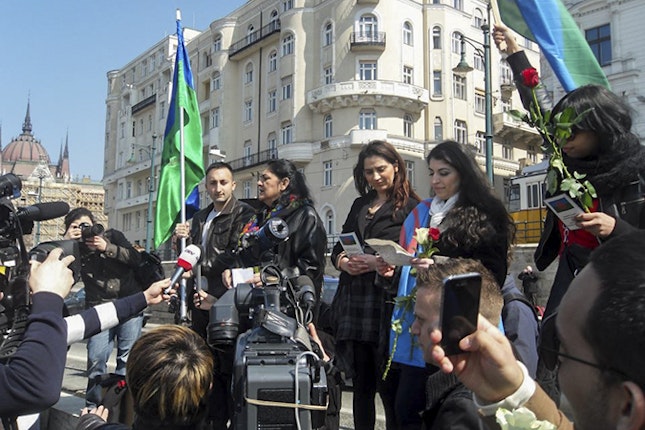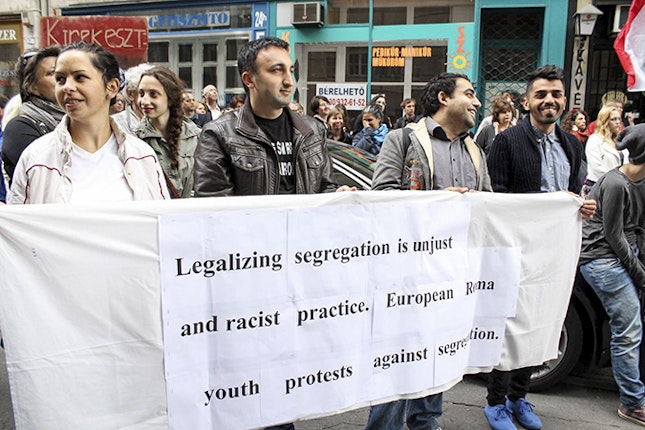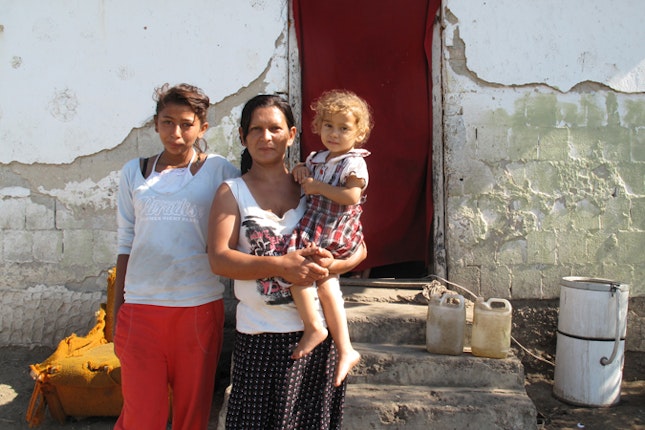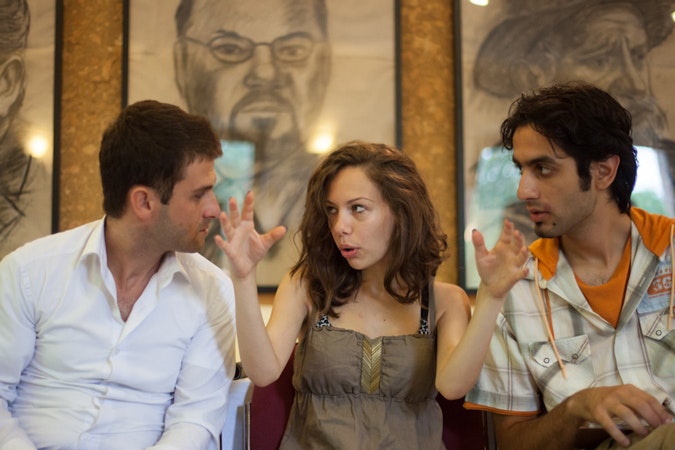Roma in Political Life: Hungary—From Transition to Hate Politics
By Chuck Sudetic
The Roma are Hungary’s largest minority. According to unofficial estimates, over the past half century the number of Roma has increased to between 500,000 and 800,000 of the country’s 10 million people, with a politically significant and growing concentration of Roma in the northeastern corner of the country. The Roma are not included in political decision-making on the national or local levels to a degree corresponding with their numbers, even in the northeast.
Why have so few Roma communities in Hungary elected Roma to voting positions on local councils, not to mention higher office? Why have so many Roma sold their votes to candidates from among the majority Hungarians and from other minority groups, and even cast ballots for racist demagogues who have whipped up hatred of the Roma themselves?
“Poverty,” answers Gabor Varady, a Roma leader in Miskolc, northeastern Hungary’s largest city. “Too many Roma think only about putting food on the table here and now. So they cast their votes for candidates who have paid them the most money or handed out the best food packets at election time. No Roma party or candidate can pay Roma individuals as much for their votes as candidates from the major political parties can pay.”
A look at circumstances and events that have marked life in northeastern Hungary since Communist rule ended in 1989 reveals an array of other factors that have also kept a critical mass of Roma from participating in their country’s political life. These include widespread illiteracy, a lack of education and marketable skills, segregation, too little appreciation for the value of education, as well as intercommunal relations charged with fear and hatred.
Many Roma say they trust no one, least of all other Roma. Many fear that asserting themselves in political life will only jeopardize their already extremely vulnerable social position.
Then there are the dampening effects of a government mechanism, officially called “Roma self-government.” It allows Roma voters to elect advisory councils that choose Roma representatives who sit in on meetings of town councils and other official bodies but have no power to vote and no say when local governments divvy up public jobs.
Unemployment and Debt in Tiszavasvári
Factory closings, massive layoffs, radical demographic shifts, a housing crash, paralyzing personal and public debt, and acts of intercommunal violence have wracked northeastern Hungary during the quarter century since the country’s Communist regime collapsed. Political leaders and parties on the conspiracy-mongering fringe of Hungary’s right wing have sought to win political support by blaming the hardship on Roma, Jews, corrupt political leaders in Budapest, global financiers, and the European Union.
One fringe party, Jobbik, won significant popular backing during the years after 2006. To promote themselves, Jobbik’s national and local leaders exploited the town of Tiszavasvári (pronounced tee-sah-VAH-shvah-ree), which had been a Socialist stronghold for the first 17 years after the fall of Communism. The town became a backdrop for Jobbik rallies where party leaders harangued against “Gypsy criminals” and Jews with phrases not heard in public since the advancing Red Army wrested control of the region from Nazi and Hungarian troops toward the end of World War II.
Tiszavasvári served Jobbik well. The euphoria that accompanied the collapse of Communism dissipated quickly there. The constitutional right to work, laws that provided for criminal prosecution of the jobless, and other regulations were jettisoned during Hungary’s post-Communist constitutional and legislative reforms. In 1989, state-owned enterprises in Tiszavasvári employed about 4,000 of the town’s 15,000 men, women, and children. Today, after a botched privatization effort, just 1,000 of Tiszavasvári’s 13,500 or so people manage to hold jobs.
Post-1989 disruptions to the town’s patterns of life—massive layoffs, the disappearance of enterprises anchoring the local economy, the inability to sell one’s house, heinous acts of violence, and a nagging fear among Hungarians, especially the elderly, that their homes would be burglarized and their gardens pilfered—fueled anxieties that led many to seek scapegoats.
“Many highly educated professionals and less-qualified people desperate for work moved away from Tiszavasvári to take jobs elsewhere,” said József Sulyok, the town’s Socialist mayor from 1981 to 2006. “Among the educated people who departed were about 60 percent of our community’s leaders.”
The burden of so many unemployed people and their families weighed heavily upon the Western European–style welfare system that had replaced the Communist system of keeping people in paying jobs by overstaffing successful enterprises and subsidizing unprofitable ones. The post-1989 factory closures hit the Hungarians hard, but they devastated the Roma. About 90 percent of northeastern Hungary’s working-age Roma are unemployed. Most of these Roma have few survival options beyond collecting welfare and other state benefits, engaging in illegal activities, and toiling under-the-table for cash in menial jobs.
Taxpayers in Hungary—like taxpayers everywhere—began to resent their money being diverted to support people who “do not have to work” and who produce more children in order to increase their household income by obtaining additional state child-benefit payments. For Hungarians, this meant the Roma. “A Gypsy family with six kids gets more money for welfare than I receive in salary,” said Tiszavasvári’s deputy mayor, József Császár, of the Jobbik party.
In the booming Roma birthrate and the continuing outflow of Hungarians from northeastern Hungary, the majority Hungarian townspeople perceive a threat to their political monopoly, Császár explained.
“Right now, the Roma could elect one or two members of the town council. When today’s children become older, they will be able to take over the town government. This is a nightmare. In ten years, it will be reality.”
Despite these fears, the Roma have yet to exercise this political potential. Why don’t they? Poverty, ignorance, cultural habits of mind, lack of opportunity … the inventory of factors is extensive.
Many destitute Roma have fallen into debt to local Roma loan sharks, which has diminished their communities’ ability to unite to elect political leaders and dampened the positive impact of Hungary’s state social welfare system. The loans typically start small and are secured by the future welfare payments the Roma, and the loan sharks, expect to receive, several Roma said. Many of the loans are taken out when a penniless family must obtain medicine, medical care, food, and other necessities; other loans, however, are taken out for non-necessities such as alcohol, furniture, or gambling debts.
At prevailing interest rates, which can run up to 100 percent per month, indebtedness grows rapidly. To escape their debts to loan sharks, some Roma families have fled Tiszavasvári, and even Hungary. Some Roma fathers have handed over their daughters to the loan sharks to work as prostitutes in Budapest and Holland until they have worked off their families’ debts. People so impoverished will demand little in exchange for something as fleeting and abstract as a vote on election day, especially when leaders of political parties pay off the feared loan sharks to instruct their debtors for whom to vote.
Two Roma Communities
Tiszavasvári has two mutually antagonistic Roma communities, the Romungro and the Oláh, who live in separate neighborhoods at opposite ends of town and do not vote as a bloc for Roma candidates. In 2010 and 2011, at a time when right-wing pressure on the Roma was enormous in Hungary, the leaders of the two communities could not manage even to form a local Roma self-government council or to choose one person who would serve as a non-voting Roma representative to the town government. In this atmosphere of mutual mistrust, many Roma fear that loan sharks will become their community’s political leaders by default.
The less numerous, more integrated, and more prosperous Romungro reside in self-built, single-family homes separated by well-kept gardens in Bűd, a neighborhood on the western side of town. Their ancestors settled in Hungary at the end of the 15th century and over time adopted the Hungarian language and Hungarian customs; many Romungro have integrated almost completely into the mainstream Hungarian community. Some Romungro still hold jobs with local enterprises, including the downsized pharmaceutical company.
Tiszavasvári’s Oláh speak the traditional Roma language and live in a neighborhood called Wide Street, or Széles Utca in Hungarian, which extends along the edge of town near the pharmaceutical plant. Even before 1989, when being unemployed was illegal, only about 30 percent of the Oláh adults living in Széles Utca had jobs, and most of them were as unskilled laborers in construction and agriculture.
Today, the Oláh community survives almost entirely from state welfare benefits and other subsidies. The government, with funds from Budapest, had houses built in Széles Utca for the Roma and presented them to Oláh families rent-free, though they were required to pay for electricity, water, and other services. Oláh extended families crowded into many of these houses.
As some families sank deeper into penury—and deeper in debt to the loan sharks—they stopped paying for their electricity and water service and sold off their houses’ water heaters, sinks, bathtubs, and other conveniences. The utility companies discontinued service to households that had not paid their bills, and these families began drawing water from a communal spigot. Oláh’s two trash bins overflow with garbage.
The squandering of public welfare money, the stripping of appliances from publicly built houses, and acts of petty crime including burglaries of Hungarian-owned homes near Széles Utca, have exasperated Tiszavasvári’s townspeople. Intercommunal relations ruptured on October 5, 2006. A 45-year-old Hungarian biology teacher from Tiszavasvári was driving through the nearby Tokaj wine district with his two young daughters. In one village, their car apparently glanced a Roma girl who had run into the road. The teacher stopped to check on the Roma girl, who was unhurt and fled.
Then a group of Roma, including the girl’s father, proceeded to beat the teacher to death before his daughters’ eyes. Jobbik seized upon this killing as a cause célèbre and began whipping up hatred of “Gypsy criminals.” Roma leaders and organizations expressed their regret about the crime, and several people, including the Roma girl’s parents, were eventually convicted on charges related to the incident and handed stiff jail sentences. But these reactions were too little and too late.
“Open expression of ethnic hatred toward Roma and Jews became legal and tolerated,” said Ági Kóka, who, in 1994, became the first Roma from Bűd ever to graduate from high school and who went on to help organize an after-school education program for Roma high school kids who sought to pursue a university education. “Practically all communication between Tiszavasvári’s Roma and Hungarian communities halted.”
A Reign of Terror
A few months later Jobbik’s 29-year-old leader, Gábor Vona, announced the establishment of a private vigilante group called the Hungarian Guard. Its colors and symbols drew upon those of the partisan militia that pro-Nazi extremists had wielded as a weapon against Jews, “Gypsy criminals,” and political opponents during the 1930s and ’40s. Many Roma were attacked during the weeks and months that followed. Firebombs exploded on Roma property. Then, inhabitants of an even more extremist Hungarian fringe decided to initiate a reign of terror.
On a Monday night in July 2008, attackers set fire to the home of a Roma family on the edge of Nagycsécs, a town 30 kilometers from Tiszavasvári. A Roma man and his sister were attempting to flee the flames when gunmen shot them down. More random fire bombings and killings followed, always against Roma living along the periphery of towns or villages. It took Hungary’s government and courts until December 2008 to disband Vona’s Hungarian Guard for illegal discrimination against the Roma.
Arson attacks and random killings of Roma continued. In February 2009, firebombs ignited a home in a village 63 kilometers south of Budapest. Gunmen then shot to death a father and his four-year-old son as they were fleeing the flames. On the evening of April 22, near Tiszavasvári, a gunman fired a single shot into the chest of Ági Kóka’s godfather, Jenő Kóka, moments after he had left his home to work the night shift at the pharmaceutical factory. The killers slipped away and killed again. Jobbik continued to whip up hysteria and direct it against Hungary’s Roma.
“The rhetoric was clear,” Ági Kóka said. “Everything was the fault of the Gypsies. And there was a campaign promise from Jobbik that they would force the Roma out.”
The election campaign of 2010 produced a radical rightward shift across Hungary’s political spectrum. Competition was fierce. Jobbik candidates railed all over Hungary against Jews, financiers, and Roma “criminals.” In Tiszavasvári, Jobbik activists went into Roma settlements bearing promises: If elected, Jobbik would provide Roma people work, Jobbik would develop the infrastructure in Roma neighborhoods, Jobbik would bring in more refuse dumpsters.
“Jobbik went to the loan sharks, and the loan sharks pressured the people who are dependent upon them,” said a Roma from Széles Utca, adding that the price Jobbik eventually paid per vote was about 10 euros.
The investment paid off. Jobbik captured almost 17 percent of the nationwide vote to become the third-strongest political party in parliament. In Tiszavasvári, Jobbik won a majority in the town council and took the mayor’s seat with 53 percent of the ballots cast.
After the victory, Jobbik’s leader Gabor Vona declared Tiszavasvári to be the “capital” of the Jobbik movement. Liberal and moderate Hungarians in the town grew disgusted with the Roma who, against their own long-term interests, had sold their votes to the extremists.
Jobbik’s promises to Tiszavasvári’s Roma evaporated. By the summer of 2012, men hanging out and drinking beer in Széles Utca complained of not having a job. The social welfare system had become less generous to the point where even the loan sharks were extorting less money. Many Roma complained that the government doesn’t want conditions in the Roma settlements to improve, because this would drive up the expectations of the Roma and rising expectations would drive up the cost of the Roma votes.
In October 2012, Jobbik took Tiszavasvári with a higher share of the vote than in 2010. Buses delivered Roma to the polling stations.
This article is part of a series examining Roma political participation in France, Hungary, Romania, Macedonia, Bulgaria, and the Czech Republic.
Until November 2013, Chuck Sudetic was a senior writer for the Open Society Foundations.



